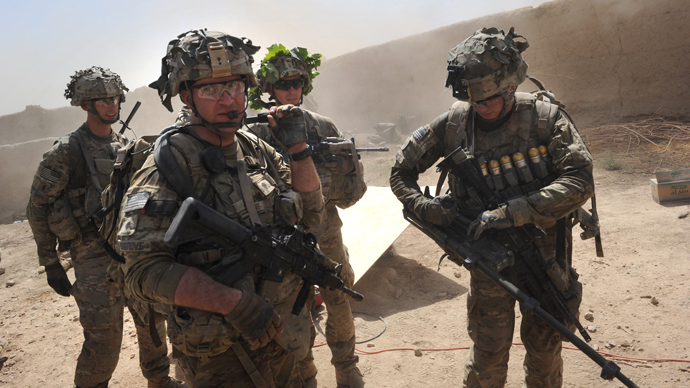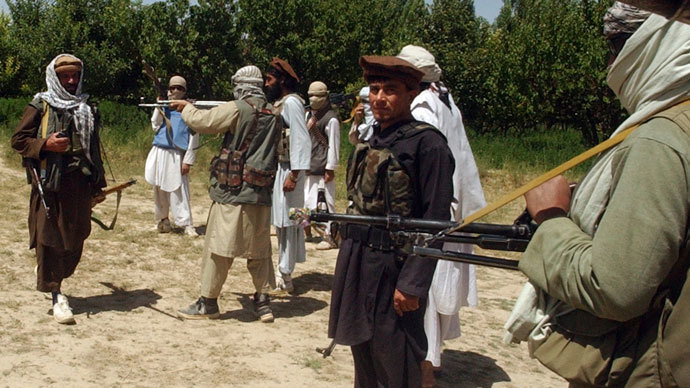Taliban back in the saddle in Afghanistan by 2017 - leaked intel report

Any success the US and its allies have enjoyed in Afghanistan in the past three years will be dramatically reduced by 2017, even if a US military presence remains in the country, according to a US intelligence report.
The National Intelligence Estimate calculates that the Taliban and other regional players, including Al-Qaeda, will begin to assert themselves as the United States winds down military operations in the war-torn country, the Washington Post reported, quoting officials familiar with the classified report.
The estimate includes analysis from the country’s 16 intelligence services.
The situation will deteriorate even more rapidly in the event that Washington and Kabul fail to sign a security agreement that allows a US-led military contingent on Afghan territory beyond 2014, an agreement that also promises to free up billions of dollars in financial aid to Afghanistan.
"In the absence of a continuing presence and continuing financial support," the intelligence estimate "suggests the situation would deteriorate very rapidly," the newspaper quoted one US official familiar with the report as saying.
Some officials, however, expressed the opinion that the intelligence estimate of the longest war in American history was “overly pessimistic” and failed to consider various factors, including the improved effectiveness of Afghanistan's security forces, which will be handed the task of preventing Taliban resurgence, as well as the outcome of next year’s presidential election.
"I think what we're going to see is a recalibration of political power, territory and that kind of thing," the paper quoted another official as commenting. "It's not going to be an inevitable rise of the Taliban."
A senior administration official told the newspaper that the intelligence estimate has a tendency to paint a gloomy picture of the situation in Afghanistan.
“An assessment that says things are going to be gloomy no matter what you do, that you’re just delaying the inevitable, that’s just a view,” said the official. “I would not think it would be the determining view.”
“By no means has the surge defeated the Taliban,” the official said, but it did help to “reverse the Taliban’s momentum and give the government more of an edge. I think we achieved that.”
Afghan President Hamid Karzai has kept Washington waiting on the Bilateral Security Agreement that would allow a US-led contingency, including some 15,000 American troops, to remain in the country beyond 2014. The reason is clear: Karzai, under Afghan public opinion pressure, is reluctant to grant immunity for any US troops left on the ground in Afghanistan, following the declared 2014 pullout date.

The Afghan people have witnessed too much indiscriminate killing of innocent citizens to give license for more such behavior. On the American holiday of Thanksgiving, for example, a US drone attack left one child dead and two women injured as NATO forces claimed they were trying to kill a lone "known militant" in Helmand Province.
Meanwhile, analysts fear that Kabul’s grip on power is likely to become increasingly irrelevant as it loses “purchase” over various regions of the country, another official said.
The White House refused to comment on the NIE’s report. A senior administration official said intelligence assessments are “only one tool in our policy analysis toolbox.”
“One of the intelligence community’s principal duties is to warn about potential upsides and downsides to US policy, and we frequently use their assessments to identify vulnerabilities and take steps to correct them,” the statement said. “We will be weighing inputs from the [intelligence services] alongside those of the military, our diplomats and development experts as we look at the consequential decisions ahead of us, including making a decision on whether to leave troops in Afghanistan after the end of 2014.”
Stephen Biddle, a defense policy expert at the Council on Foreign Relations, said experts are largely pulled between two views on the future prospects in Afghanistan. One side sees Afghan security forces eventually forcing the Taliban into some sort of political agreement. Another side forecasts that the Taliban, which the United States blamed for harboring Al-Qaeda mastermind, Osama bin Laden, will gradually regain its former influence in the country.
Biddle said much depends on how Congress, which is becoming increasingly wary of continuing its military presence in the country, decides on the matter.
“Whether it’s a worse or better stalemate depends on the rate at which Congress defunds the war,” he said.
At the moment Washington still has 63,000 troops on the ground. Earlier in December, an Associated Press-GfK poll found that 57 percent of Americans say going to war in Afghanistan as response to the September-11 terrorist attacks was probably the “wrong thing to do.” A minority of US citizens is in favor of the current withdrawal plan, with 53 percent saying the process is taking too long and 34 percent responding that the troop withdrawal is about right.














